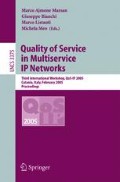Abstract
This paper presents an adaptive resource allocation model that is based on the DRR queuing policy. The model ensures QoS requirements and tries to maximize a service provider’s revenue by manipulating quantum values of the DRR scheduler. To calculate quantum values, it is proposed to use the revenue criterion that controls the allocation of free resources. The simulation considers a single node with the implemented model that serves several service classes with different QoS requirements and traffic characteristics. It is shown that the total revenue can be increased due to the allocation of unused resources to more expensive service classes. At the same time, bandwidth and delay guarantees are provided. Furthermore, the adaptive model eliminates the need to find the optimal static quantum values because they are calculated dynamically.
Access this chapter
Tax calculation will be finalised at checkout
Purchases are for personal use only
Preview
Unable to display preview. Download preview PDF.
References
Braden, R., Clark, D., Shenker, S.: Integrated Services in the Internet Architecture: an Overview. IETF RFC 1633 (1994)
Blake, S., Black, D., Carlson, M., Davies, E., Wang, Z., Weiss, W.: An Architecture for Differentiated Services. IETF RFC 2475 (1998)
Bernett, Y.: The complementary roles of RSVP and Differentiated Services in the full-service QoS network. IEEE Communications 38, 154–162 (2000)
Bernet, Y., Ford, P., Yavatkar, R., Baker, F., Zhang, L., Speer, M., Braden, R., Davie, B., Wroclawski, J., Felstaine, E.: A framework for Integrated Services operation over DiffServ networks. IETF RFC 2998 (2000)
Floyd, S., Jacobson, V.: Link-sharing and resource management models for packet networks. IEEE/ACM Transactions on Networking 3, 365–386 (1995)
Sayenko, A., Hämäläinen, T., Siltanen, J., Joutsensalo, J.: An adaptive approach for Weighted Fair Queueing with revenue as the optimization criterion. In: The 8th IEEE Symposium on Computers and Communications (ISCC 2003), pp. 181–186 (2003)
Sayenko, A., Hämäläinen, T., Joutsensalo, J., Raatikainen, P.: Adaptive scheduling using the revenue-based Weighted Round Robin. In: The 12 IEEE International Conference On Networks (ICON 2004) (in press)
Joutsensalo, J., Hämäläinen, T., Pääkkönen, M., Sayenko, A.: QoS- and revenue aware adaptive scheduling algorithm. Journal of Communications and Networks 6, 68–77 (2004)
Magaña, E., Morató, D., Varaiya, P.: Router scheduling configuration based on the maximization of benefit and carried best effort traffic. Telecommunication systems 24, 275–292 (2003)
Zhang, H.: Service disciplines for guaranteed performance service in packetswitching networks. Proceeding of IEEE 83, 1374–1396 (1995)
Kleinrock, L.: Queueing systems. John Wiley & Sons, New York (1975)
Hahne, E.: Round Robin scheduling for fair flow control. PhD thesis, MIT, Cambridge (1986)
Parekh, A., Gallager, R.: A generalized processor sharing approach to flow control in integrated services networks: The single node case. IEEE/ACM Transactions on Networking 1, 344–357 (1993)
Shreedhar, M., Varghese, G.: Efficient fair queuing using deficit round-robin. IEEE/ACM Transactions on Networking 4, 375–385 (1996)
McKenny, P.: Stochastic fairness queueing. In: 9th Annual Joint Conference of the IEEE Computer and Communication Societies, vol. 2, pp. 733–740 (1990)
Vegesna, S.: IP Quality of Service, 1st edn. Cisco Press (2001)
Cruz, R.: A calculus for network delay, Part I: Network elements in isolation. IEEE Transaction on Information Theory 37, 114–131 (1991)
Thie, P.: An Introduction to Linear Programming and Game Theory, 2nd edn. John Wiley & Sons, New York (1988)
UCB/LBNL/VINT: Network simulator ns-2 (1997), http://www.isi.edu/nsnam/ns
Author information
Authors and Affiliations
Editor information
Editors and Affiliations
Rights and permissions
Copyright information
© 2005 Springer-Verlag Berlin Heidelberg
About this paper
Cite this paper
Sayenko, A., Hämäläinen, T., Joutsensalo, J., Raatikainen, P. (2005). Revenue-Based Adaptive Deficit Round Robin. In: Ajmone Marsan, M., Bianchi, G., Listanti, M., Meo, M. (eds) Quality of Service in Multiservice IP Networks. QoS-IP 2004. Lecture Notes in Computer Science, vol 3375. Springer, Berlin, Heidelberg. https://doi.org/10.1007/978-3-540-30573-6_47
Download citation
DOI: https://doi.org/10.1007/978-3-540-30573-6_47
Publisher Name: Springer, Berlin, Heidelberg
Print ISBN: 978-3-540-24557-5
Online ISBN: 978-3-540-30573-6
eBook Packages: Computer ScienceComputer Science (R0)

